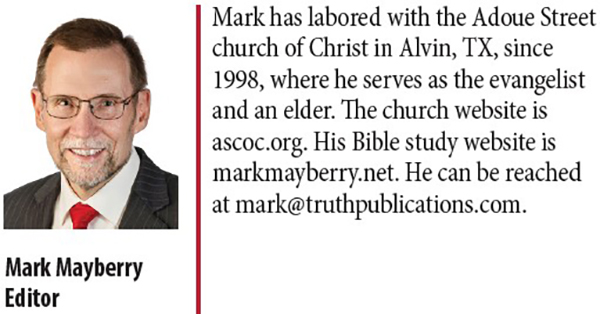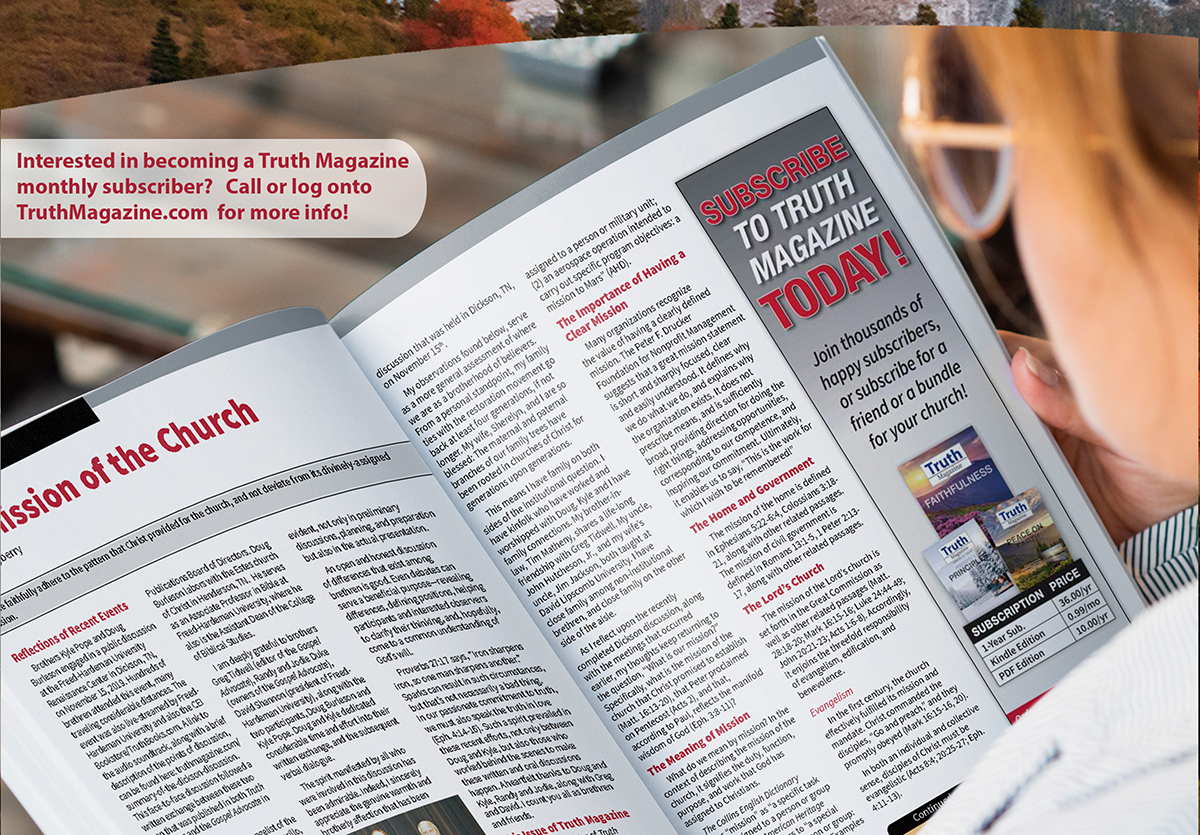by Mark Mayberry
Synopsis: This issue of Truth Magazine focuses on the indwelling of the Holy Spirit, a subject of considerable interest, and sadly, much speculation. Thanks to Bruce Reeves and Kyle Pope for helping assemble these topics and writers.
How does the Holy Spirit dwell in us? What is the nature of this indwelling? Is it literal or symbolic? Does it result in outward manifestations or gifts, as Charismatics and Pentecostals claim? Is it through the word or separate from it? Does it still allow individual freedom of choice, or is it an overpowering and constraining force?
When we speak of indwelling, in reality, this is a commonplace concept. Consider the following familiar applications.
While homes may vary in size, shape, construction, and craftsmanship, most would agree with the sentiment, “Mid pleasures and palaces though we may roam, be it ever so humble, there’s no place like home.”
Abraham dwelt in tents (Heb. 11:9). The Israelites dwelt in paneled houses (Hag. 1:3-4). For a time, Peter stayed in the house of Simon the Tanner, who lived by the sea (Acts 10:32).
We may live in the quiet countryside, the sameness of suburbia, or a bustling, crowded city. Jesus dwelt in Nazareth (Matt. 2:23). On Pentecost, Peter preached to men who lived in Judea and Jerusalem, plus pilgrims from outside Israel (Acts 2:14).
Jews and proselytes dwelt throughout the Mediterranean world (Acts 2:8-11). Saints in Antioch sent funds to assist brethren living in Judea (Acts 11:29). During Paul’s tenure at Ephesus, all who lived in Asia heard the word (Acts 19:10).
While some jokingly say, “Men are from Mars and women from Venus,” and science fiction speculates about life in other worlds, reality is more mundane: We are earthbound creatures. God created the world for human habitation. The first pair were commanded, “Be fruitful and multiply, and fill the earth, and subdue it. . .” (Gen. 1:28). The Apocalypse repeatedly refers to those who dwell on the earth (Rev. 3:10; 6:9-10; 8:13). The choice is simple: Will we glorify God in this life as did Jesus (John 17:4) or incur His wrath as did imperial Rome (Rev. 11:18)?
During the first century, when Satan was permitted to directly impact men’s lives (so that the greater power of Jesus Christ might be manifested), we read of demon possession (Matt. 8:28-34; Luke 11:24-26; Acts 16:16-18). Yet, this phenomenon, like the apostolic gifts of the spirit, have no modern parallel. When the gospel message was fully revealed, the partial gifts of the Spirit were done away (1 Cor. 13:8-10).
The devil is a deadly foe who seeks to devour and destroy (1 Pet. 5:8-9). Satan entered Judas (Luke 22:1-4). Ananias allowed the evil one to fill his heart (Acts 5:1-3). Saints in Pergamum remained faithful, even when faced with persecution and martyrdom: “You did not deny My faith even in the days of Antipas, My witness, My faithful one, who was killed among you, where Satan dwells” (Rev. 2:12-13). Through maintaining self-control in attitude and action, we can avoid giving place (i.e., opportunity) to the devil (Eph. 4:26-27).
Through yielding to temptation, sin dwells in us (Rom. 7:14-20). If we walk according to the course of this world—living according to fleshly desires and lusts—we incur divine wrath. The prince of the power of the air works in the sons of disobedience (Eph. 2:1-3), resulting in darkness and spiritual death (Ps. 107:10-11).
In the Mosaic era, God dwelt in the tabernacle (Exod. 25:8-9; 29:44-46), and later the temple (1 Kings 6:11-13; Acts 7:46-50). In the Christian dispensation, the Godhead dwells in the church, a spiritual house composed of living stones (Eph. 1:22-23; 3:20-21; 1 Pet. 2:4-5).
The Father dwells in the Son even though they are distinct from One Another (John 14:10; 17:22-23; Col. 1:19; 2:9). In contrast with men (who received differing measures of the Spirit), Jesus Christ received the Spirit without measure (John 3:34-35). The Holy Spirit rested upon the Messiah, empowering Him to preach the good news of salvation and perform salutatory and supportive miracles (Isa. 11:1-2; Luke 4:16-21).
The Father dwells in faithful Christians (Isa. 57:15; 2 Cor. 6:16-18; Eph. 2:19-22; 4:6; 1 John 4:16). The Son dwells within His faithful followers (John 14:23-24; 15:4-5; Gal. 2:20; 2 Cor. 13:5; Eph. 3:17). The Holy Spirit dwells within devout disciples (John 14:16-17; Rom. 8:9-11; 1 Cor. 3:16; 6:19; 2 Tim. 1:14; Jas. 4:4-5). The word dwells in those who trust and obey (John 15:7; Col. 3:16; Phil. 4:8; 1 John 2:14, 24; 3 John 3).
The Charismatic/Pentecostal approach should be rejected because it is rooted in subjectivism and divorced from truth. What about those among us who advocate a direct, personal indwelling of the Holy Spirit? While the peril may not be as pronounced, dangers remain: Subjectivism can easily lead to self-justification. “I feel right about this. . . The Holy Spirit is leading me to this conclusion” (when “this” is a spiritually questionable action, activity, or attitude).
An honest and open-minded consideration of the preceding passages reveals that God the Father, God the Son, and God the Holy Spirit similarly dwell in us. We have little trouble comprehending God the Father dwelling in us. The same is true regarding His Son, Jesus Christ. Why are we so quick to make the Holy Spirit’s indwelling mysterious and mystical—even borderline magical?
This unity of spirits occurs as we walk according to God’s revealed pattern. Consider an Old Testament example: Ezekiel describes the apostate Jews who set up idols in their hearts (Ezek. 14:3, 7; 20:16). Jeremiah described the same class of idolaters, saying they loved false gods, served them, walked after them, sought them, and worshiped them (Jer. 8:1-2). This is how false gods—or for that matter, the one true God—dwells in our hearts. If we do what they did for idols, but strictly to the Lord, who would deny that God the Father, Jesus Christ the Son, and the Holy Spirit would be dwelling in us?
Friend, will you not obey the gospel so that you can share a relationship with God here and dwell with Him throughout all eternity (Ps. 15:1-5; Rev. 21:3-4).



